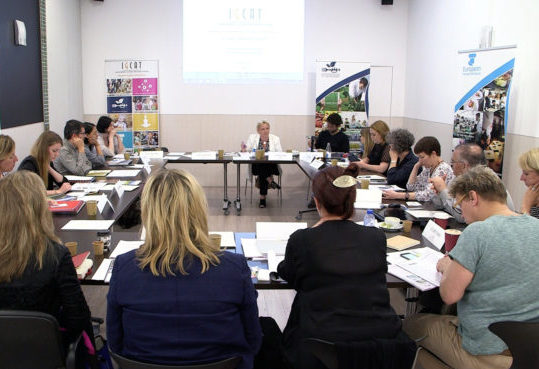The fourth IGCAT Annual Experts’ Meeting, has taken place at the close of a very successful year, Catalonia and Minho, European Region of Gastronomy 2016 and, on the occasion of IGCAT’s 5th birthday. The meeting has gathered together expert voices from 10 countries from around the globe to share their views on the theme Smart and Sustainable Destinations: trends, challenges and opportunities.
On Tuesday 25 April experts were invited by Prodeca, Generalitat de Catalonia (one of the lead stakeholder’s for C’REG 2016 and supporter of the European Young Chef Award) to hold the celebrated meeting, which was divided in three important sections:
Long-term legacy of the Regions of Gastronomy
The first section was about the long-term legacies of the European Region of Gastronomy. Thus, the invited speakers have discussed how they envisage their region’s legacy. Besides, Prodeca have introduced the Gastronomy Plan, that was developed through a large stakeholder consultation process during Catalonia, European Region of Gastronomy 2016 (C’REG). The group explored how we could expand and improve the Regions of Gastronomy Platform through our growing network of experts.
The first section, was moderated by Ramon Sentmartí, Director of PRODECA – Generalitat de Catalunya. In addition, Anja van Hout -External Relations Advisor of Municipality of ́S-Hertogenbosch – exposed the Overlapping legacies – Bosch 2016 and European Region of Gastronomy 2018. Ilona Sares -International Project Coordinator of ProAgria – explained how they are planning a legacy for Kuopio, one of the candidate regions for the title European Region of Gastronomy 2020. Blanca Cros from the Catalan Tourism Agency – talked about the next steps after the year Catalonia, European Region of Gastronomy 2016. Finally, Carlos Fernandes – Tourism Course Leader of ESTG-IPVC – who explained the situation of food creativity and territorial branding during Minho 2016.
Smart and sustainable destinations
IGCAT believes that regional gastronomy and culture are the most important leverages for new development opportunities. Both food products and creative experiences are important tools in ‘branding’ a destination but local SME’s often fail to see their strategic role within the external image of the territory.
The invited speakers were Dr. Edith Szivas – Tourism Expert – who talked about the UNWTO and the sustainable tourism. Fia Gulliksson – CEO and founder of Food In Action company – who exposed the work she has been doing with her company and the importance of creativity in gastronomy. The format for events and creative experience can vary but what makes them distinct is the uniqueness of the raw products and craft techniques used. Developing events that ensure visitors stay over and spend more is key to smart policies. Ensuring the sustainability of events both economically and environmentally is another challenge.
Jacinta Dalton – Failte Ireland Food Ambassador & GMIT exposed the subject Packaging food tourism experiences for the Wild Atlantic Way incl. Galway during European Region of Gastronomy 2018. Prof. Roberta Garibaldi – Director, East Lombardy 2017 – who exposed the research on food tourism from 11 different countries. Oriol Costa Lechuga – Director of EcoRegió Catalonia – who explained the development of synergies for regional ecological food and agriculture. Claire Brightley – Environment Expert for the UK – who talked about climate change and how it affects weather, farming and tourism in Europe.
The day ended with the welcome to Sant Pol de Mar from the Mayoress, Monserrat Garrido and with a light dinner at EUHT StPOL, one of the foremost hospitality schools in Europe.
IGCAT (International Institute of Gastronomy, Culture, Arts and Tourism) is an international network of experts from gastronomy, culture, art and tourism and other sectors who have an interest in the exciting areas to be developed when there is a convergence between these sectors. Together with its global network of experts, the IGCAT secretariat conducts research, develops projects and organise events related to this confluence and is particularly focused on how it may be used in regional and local development.

